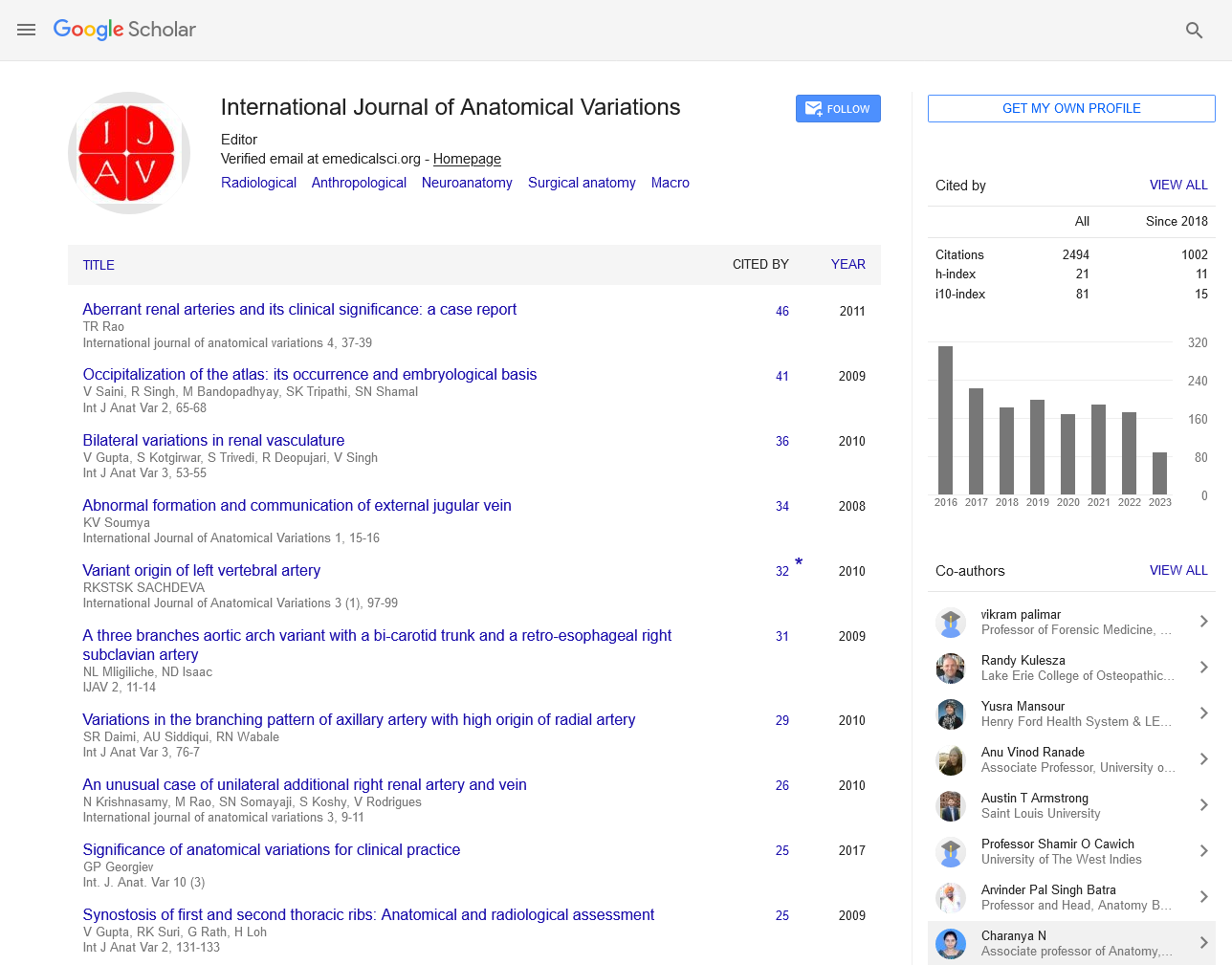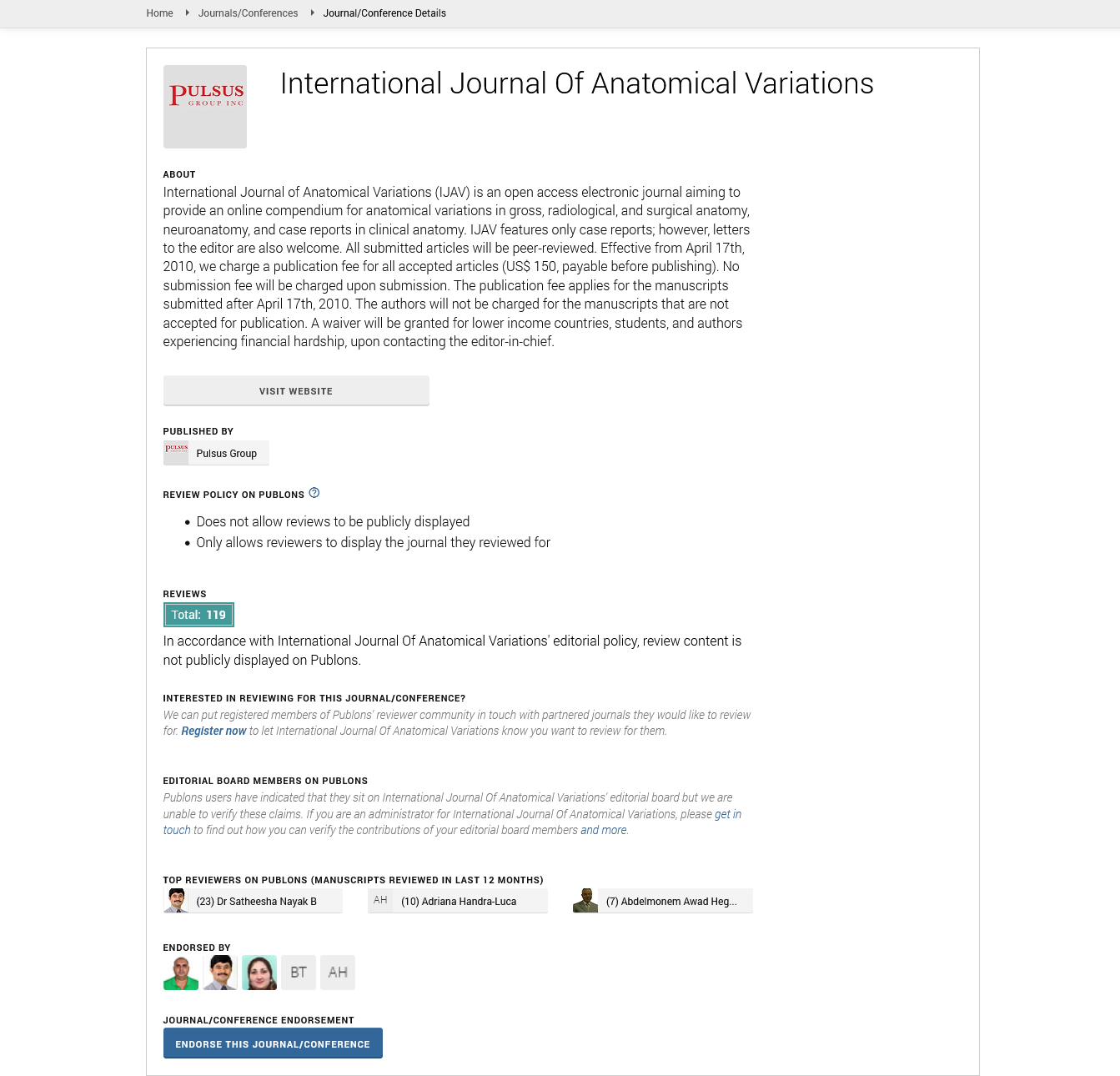Anatomical Variation in Gut Microbiota Studies
Received: 29-Apr-2022, Manuscript No. ijav-22-4944; Editor assigned: 02-May-2022, Pre QC No. ijav-22-4944 (PQ); Accepted Date: May 20, 2022; Reviewed: 16-May-2022 QC No. ijav-22-4944; Revised: 20-May-2022, Manuscript No. ijav-22-4944 (R); Published: 27-May-2022, DOI: 10.37532/1308-4038.15(5).198
Citation: Karl M. Anatomical Variation in Gut Microbiota Studies. Int J Anat Var. 2021;15(5):176-176.
This open-access article is distributed under the terms of the Creative Commons Attribution Non-Commercial License (CC BY-NC) (http://creativecommons.org/licenses/by-nc/4.0/), which permits reuse, distribution and reproduction of the article, provided that the original work is properly cited and the reuse is restricted to noncommercial purposes. For commercial reuse, contact reprints@pulsus.com
Abstract
The microbiota of the gut is the most complex of all anatomic sites in terms of total numbers of bacteria that interact closely with the mucosal immune system and contribute various functions to host physiology. Especially in the proximal large intestine a diverse microbiota ferments complex substrates such as dietary fiber and host mucins, but also metabolizes bile acids and phytoestrogens that reach the large intestine. It is now well established that microbiota composition differs between but over time also within individuals. However, a thorough understanding of the sources of variations in microbiota composition, which is an important requirement for large population based microbiota studies is lacking. Microbiota composition varies depending on what kind of sample is collected, most commonly stool samples, stool swabs or superficial rectal or intestinal biopsies, and the time of collection.
Keywords
Gut microbiota; Metagenome; Community structure; Mucins
Introduction
T here has been a recurring interest in studying associations between the human commensal gut micro biota and health, ever since Metchnikoff suggested in the early twentieth century that micro biota composition can be positively modified by consuming ‘beneficial’ microbes, such as milk fermenting lactic acid bacteria [1]. Although micro biota have been studied ever since, using mainly conventional culture based methods until the development of molecular tools towards the end of the last century, it is the availability of high throughput sequencing technologies that now provides the tools needed for in depth studies. Through its immense metabolic capabilities the gut micro biota contributes to human physiology by transforming complex nutrients such as dietary fiber or intestinal mucins that otherwise would be lost to the human host into simple sugars, short chain fatty acids and other nutrients that can be absorbed [2]. Furthermore, the micro biota produces some essential vitamins including vitamin K, vitamin B12 and folic acid, contributes to intestinal bile acid metabolism and recirculation, transforms potential carcinogens such as N-nitroso compounds [NOCs] and he terocyclic amines [HCAs] and activates bioactive compounds including phytoestrogens. Differences in environmental factors including diet as well as hosts genetics are thought to contribute to micro biota diversity [3].
Necrotizing enterocolitis (NEC) is a disease of preterm infants that recently has received interest for potential contributions of microbiota. Preterm infants are often delivered by C-section, they frequently receive antibiotics and their feeding habits differ from those of full term infants. Under these circumstances, the normal development of gut microbiota likely is distorted and possibly can initiate a disproportional immune response that results in NEC [4]. Currently, prospective cohort studies are underway that are aimed at elucidating this association. A crucial requirement for the design of future studies aimed at correlating microbiota with various GI and other diseases is a thorough quantitative understanding of the variation in microbiota composition between individuals but also within them over time is. Below we discuss recent advances as well as remaining shortcomings in our knowledge of microbiota variations [5].
Acknowledgement
None.
Conflict of Interest
None.
Conflict of Interest
- Foivos I, Jonathon K, Daryll B, et al. Aberrant right subclavian artery - a rare congenital anatomical variation causing dysphagia lusoria. Vasa. 2021; 504(5):394-397.
- Laurent de K, Stefano M. Variability of repairable bicuspid aortic valve phenotypes: towards an anatomical and repair-oriented classification. Eur J Cardiothorac Surg. 2019; 37(11):9-828.
- Xin W, Bofu L. Aortic Dissection with Rare Anatomical Aortic Arch Variation Depicted by Computed Tomography Angiography. Heart Surg Forum. 2021; 24(2): E407-E408.
- Penprapa SK, Brianna KR. Duplication of the inferior vena cava: evidence of a novel type IV. Folia Med Cracov. 2020; 28; 60(2):5-13.
- Schizas N, Patris V, Lama N, et al. Arc of Buhler: A lifesaving anatomic variation. A case report. J Vasc Bras. 2012; 37(11):9-326.
Indexed at, Google Scholar, Crossref
Indexed at, Google Scholar, Crossref
Indexed at, Google Scholar, Crossref
Indexed at, Google Scholar, Crossref






